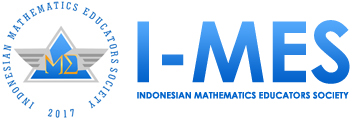Profil Pemahaman Holistik Mahasiswa Pengajaran Mikro Kelas B tentang Pembelajaran Matematika Berbasis HOTS
DOI:
https://doi.org/10.35706/sjme.v5i1.4523Abstract
Higher-order thinking skills (HOTS) are essential skills required in 21st-century learning. This study aims to describe students' understanding of HOTS-based mathematics learning holistically. The comprehension in question includes insight into HOTS-based mathematics learning, both general comprehension and HOTS-based mathematics instructional design, and an understanding of HOTS-based problems (insight and ability to solve problems). This research was a qualitative study with the subject of 16 students of class B Micro Teaching lectures. Data were gathered from context questionnaires and HOTS profile questionnaires, observations of learning practices, tests, and interviews. Data analysis used was a qualitative technique consisting of data reduction, data presentation, and drawing conclusions and verification. The results showed that the students had a good understanding of HOTS-based mathematics learning. HOTS is understood as a skill that requires critical and creative thinking in solving problems at the level of analysis, evaluation, and creation. The majority of HOTS-based learning activities were shown by giving HOTS questions. Students have a good understanding of HOTS questions but this is not the case in creating and solving problems. Students' ability in solving HOTS level questions still needs to be improved.
Downloads
References
Anderson, L.W., & Krathwohl, D. R. (2001). A Taxonomy for Learning, Teaching, and Assessment: A Revision of Bloom’s Taxonomy of Educational Objectives. New York: Addison Wesley Longman
Dinni, H.N. (2018). HOTS (High Order Thinking Skills) dan Kaitannya dengan Kemampuan Literasi Matematika. PRISMA, Prosiding Seminar Nasional Matematika. https://journal.unnes.ac.id/sju/index.php./prisma/ 170-176
Dosinaeng, WBN., Leton, SI, Kalapu, M. (2019). Kemampuan Mahasiswa Dalam Menyelesaikan Masalah Matematis Berorientasi HOTS.JNPM (Jurnal Nasional Pendidikan Matematika. 3, (2). http://dx.doi.org/10.33603/jnpm.v3i2.2197
Fisher, R. (2010). Thinking Skill: Learning to Teach in The Primary School (2nd ed). New York: NY Rouutledge
Handini, E. O., Asnimar &, Laihat (2020). Analisis Pemahaman Guru SD Negeri Kelas Vi Di Kota Palembang Tentang Penilaian Berbasis Hots Dalam Pembelajaran. Undergraduate thesis, Sriwijaya University. https://repository.unsri.ac.id/28873/
Helmawati. (2019). Pembelajaran dan Penilaian Berbasis HOTS. (P. Latifah, Penyunt.) Bandung: PT Remaja Rosdakarya.
Jailani, Sugiman, Retnawati, H., Bukhori, Apino, E., Djidu, H., & Zainal, A. (2018). Desain Pembelajaran Matematika untuk Melatihkan Higher Order Thinking Skills. (H. Retnawati, Penyunt.) Yogyakarta: UNY PRESS.
King, FJ., Goodson, L., Rohani, F.. (2009). High Order Thinking Skills. A Publication of the educational Service Program. Center for the Advancement of Learning and Assessment. http://www.cala.fsu.edu/files/higher_order_thinking_skills.pdf .Diakses pada 14 Juni 2020.
Krulik, S. & Rednick, J.A. (1999). Innovative Task to Improve Critical and Creative Thinking Skill. Reston, Virginia: NCTM
Kuntarto, E., dkk. (2019). Kemampuan Mahasiswa PGSD dalam Merancang dan Melaksanakan Pembelajaran Berbasis High Order of Thinking Skills. Jurnal Kiprah 7 (2): 107-116. https://ojs.umrah.ac.id/index.php/kiprah/
Mairing, J.P., Syahran, S., Pancarita,, & Suparman. (2018). Higher Order Thinking Skills Mahasiswa Pendidikan Matematika dalam Memecahkan Masalah Struktur Aljabar. Prosiding Seminar Nasional Riset Inovatif (SENARI Ke-6). Diambil dari https://lppm.undiksha.ac.id/senari2018/
Nugroho, R. A. (2019). HOTS (Kemampuan Berpikir Tingkat Tinggi, Konsep, Pembelajaran, Penilaian dan Soal-soal. Jakarta: Kompas Gramedia.
OECD. (2014). PISA 2012 Results in Focus.
https://www.oecd.org/pisa/keyfindings/pisa-2012-results-overview.pdf Diakses pada 30 Oktober 2019
OECD. (2016). Programme For International Student Assessment (PISA) Results From
PISA 2015. https://www.oecd.org/pisa/PISA-2015-Indonesia.pdf Diakses pada 25 Oktober 2019
OECD. (2019). PISA 2018 Results. Paris : OECD Publishing.
https://www.oecd.org/pisa/Combined_Executive_Summaries_PISA_2018.pdf Diakses pada 1 Mei 2020
P21. (2007). The Intellectual and Policy Foundations of the 21st Century Skills Framework. Washington DC, Partnership for 21st Century Skills. https://issuu.com/bmackenz/docs/21_century__framework
Pratama & Retnawati, H. (2018). Urgency of Higher Order Thinking Skills (HOTS) Content Analysis in Mathematics Texbook. J. Phys.: Conf. Ser.1097 012147
Rapih, S. & Sutaryadi. (2018). Perpektif Guru Sekolah Dasar terhadap Higher Order Tinking Skills (HOTS): Pemahaman, Penerapan dan Hambatan. Premiere Educandum: Jurnal Pendidikan Dasar dan Pembelajaran, 8(1), 78-87. http://doi.org/10.25273/pe.v8i1.2560
Saputra, H. (2016). Pengembangan Mutu Pendidikan Menuju Era Global: Penguatan Mutu Pembelajaran dengan Penerapan HOTS (High Order Thinking Skills). Bandung: SMILE’s Publishing.
Saido, G.A.M et al. (2015). Malaysian Online Journal of Education Management 3, 16-30
Widana, I.W. (2017). Modul Penyusunan Soal Higher Order Thinking Skills (HOTS). Jakarta: Direktorat Pembinaan SMA Dirjen Pendidikan Dasar dan Menengah Kemdikbud
Wulandari, E. (2019). Profil Kemampuan Menyusun Rencana Pelaksanaan Pembelajaran Saintifik oleh Calon Guru Matematika. Jurnal Pengembangan Pembelajaran Matematika (JPPM), 1(2), 30-37. http://dx.doi.org/10.14421/jppm.2019.12.30-37
Yen, T. S., & Halili, S. H. (2015). Effective Teaching of Higher Order Thinking (HOT) in Education. The Online Journal of Distance Education and e-Learning, 3, 41-47.
https://tojdel.net/journals/tojdel/articles/v03i02/v03i02-04.pdf
Downloads
Published
How to Cite
Issue
Section
License

This work is licensed under a Creative Commons Attribution-ShareAlike 4.0 International License.
Authors who publish with this journal agree to the following terms:
- Authors retain copyright and grant the journal right of first publication with the work simultaneously licensed under a Creative Commons Attribution License that allows others to share the work with an acknowledgment of the work's authorship and initial publication in this journal.
- Authors are able to enter into separate, additional contractual arrangements for the non-exclusive distribution of the journal's published version of the work (e.g., post it to an institutional repository or publish it in a book), with an acknowledgment of its initial publication in this journal.
- Authors are permitted and encouraged to post their work online (e.g., in institutional repositories or on their website) prior to and during the submission process, as it can lead to productive exchanges, as well as earlier and greater citation of published work (See The Effect of Open Access).











